
If you need a quick snack that's high in protein but isn't sweet, jerky is a flavorful choice. Raw meat is preserved through the quick drying process of a dehydrator. While salt adds flavor, it's not necessary to cure the jerky, as it is for curing ham or fish for example. Make your own jerky for much less cost than you'd pay in the store. Choose from lean beef, pork or chicken. While you don't need curing salt, there are a few other things you do need.
Seasonings and Marinades
A marinade bumps up the flavor of the meat. Try combining steak sauce, garlic and onion powder with apple cider vinegar. An Asian-influenced seasoning would be soy sauce, fish sauce, rice wine vinegar, brown sugar, ginger and cinnamon. Go Southwest with lime juice, cilantro, cumin and red pepper flakes. Another option is to use 1 part of your favorite barbecue sauce with 1 part vinegar. Add salt if you like, but it doesn't have to be curing salt.
Meat Matters
The method you use to prepare the meat and the cuts you select impact the quality of the jerky. Fat has a tendency to go rancid, so a less fatty cut of meat, such as round steak, works better than a cut like chuck that has streaks of fat through it. Although tenderloin is a lean cut of beef, don't waste money on making jerky out of it; you won't notice the difference from cheaper cuts of beef in the final product. Remove the skin from chicken or turkey and as much fat as you can. Do the same for pork. Pork loin works well, as the fat surrounds the meat so it's simple to cut off. Slice the meat no more than 1/4 inch thick. Thinner is better.
Safety Tips
FoodSafety.gov recommends that jerky be fully cooked before drying. Accomplish that by baking the meat strips in an oven preheated to 275 F for 10 minutes. Slip an instant-read thermometer between two strips. When it reaches 145 F, transfer the strips to the dehydrator. Another way to cook the meat is to boil the strips in their marinade for five minutes, then place in the dehydrator. After cooking, a vinegar bath helps make the meat safe to dry.
Dehydrator or Oven
Choose between drying in the oven or a dehydrator, because either works, as long as a steady temperature of 130 F to 170 F is maintained. Test the dehydrator with an oven thermometer. Place slices on the dehydrator trays, or cookie trays for the oven, so they don't overlap. Warm dry air has to circulate around the meat to dry it. Depending on the meat, the thickness of the slices, and the humidity, the meat should dry to jerky within 12 to 24 hours.
Related Articles

How to Cook Beef Teriyaki Jerky in a ...
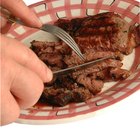
How to Cook Dry Aged Steak

Does Simmering Ground Beef Make It More ...
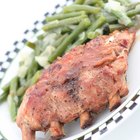
How to BBQ Ribs on a Smoker

How to Cook London Broil

How to Cook Bacon-Wrapped Deer Loin

How to Cook Barbecue Deer in the Slow ...

How to Make a Juicy Pork Tenderloin

How to Tenderize Jerky
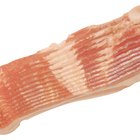
The Best Way to Cook Pork Belly Strips

How to Make Jalapeno Beef Jerky

How to Make a Venison Rub
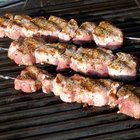
How to Cook Pork Loin
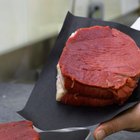
How to Slice Round Steak for Jerky
How to Make Beef Bottom Round Roast ...

How to Eat Alligator
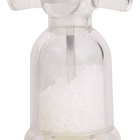
How to Dry Meat With Salt

How to Salt Cure Jerky
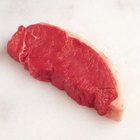
How to Slice a Roast for Jerky

How to Smoke Buffalo Meat
Resources
Writer Bio
Katie Jensen's first book was published in 2000. Since then she has written additional books as well as screenplays, website content and e-books. Rosehill holds a Master of Business Administration from Arizona State University. Her articles specialize in business and personal finance. Her passion includes cooking, eating and writing about food.
Photo Credits
Creatas Images/Creatas/Getty Images